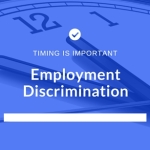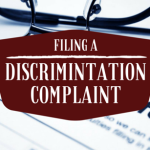The first step in determining how you go about filing a complaint against an employer is to figure out what type of complaint you are choosing to pursue. There are different legal requirements or limitations deadlines depending on the type of complaint, and various state and federal agencies have the authority to investigate depending on the type of complaint. Because the legal requirements are different depending on the type of complaint, it is always important to speak with a knowledgeable employment attorney in your area to know your legal rights and options. The following are examples of the complaint process for various employment claims:
Discrimination or Retaliatoin
Discrimination and retaliation complaints must be filed with the Texas Workforce Commission (TWC) and Equal Employment Opportunity Commission (EEOC). A complaint must be filed with the TWC within 180 days of the most recent incident of discrimination and with the EEOC within 300 days of the most recent incident of discrimination. The complaint document that an employee files is called a Charge of Discrimination, and it must be filed within the above time periods to have a viable claim. The TWC or EEOC will investigate the allegations and ultimately issue a right to sue which gives the employee the legal right to file a lawsuit.
Wage Claim
A federal wage claim is brought under the Fair Labor Standards Act (FLSA) and filed with the Department of Labor (DOL). The FLSA covers minimum wage requirements, overtime pay, exempt versus non-exempt status, and equal pay.
A wage claim can also be filed with the TWC pursuant to the Texas Payday Law. The Texas Payday Law covers the timely payment of wages, deductions from wages, compensable time, enforcement of a wage agreement, and final pay.
Once a claim is filed with either the DOL or TWC, the agency conducts an investigation to determine whether or not the employee is owed any unpaid wages.
Whistleblower Claim
The Texas Whistleblower Act covers public employees in Texas who have (1) reported in good faith what he/she believes to be a violation of federal or state law, a local government ordinance, or a rule adopted under a law or an ordinance (2) to an appropriate law enforcement authority, and (3) been suspended, terminated, or adversely affected by another personnel action for having reported the violation. If the public employee is suspended, terminated, or adversely affected, he or she must first file a grievance or appeal with the employer within 90 days of the violation (if the employer has a grievance policy or appeal procedure). Finally, the public employee must file a lawsuit under the Texas Whistleblower Act within 90 days of the violation (not including the time spent in the employer’s grievance/appeal procedure).
OSHA Violation
The Occupational Safety and Health Act (OSHA) is meant to prevent workers from being subjected to unsafe working conditions. Employees have the right to complain directly to their employer about perceived OSHA violations or file a complaint directly with the Occupational Safety & Health Administration.
If an employee is fired, demoted, transferred, or discriminated against in another way for having filed an OSHA complaint, the employee has the right to file a discrimination complaint with OSHA within 30 days of the alleged retaliation.
Before filing any complaint, consult with an employment attorney in your area to best understand your legal rights and obligations.








